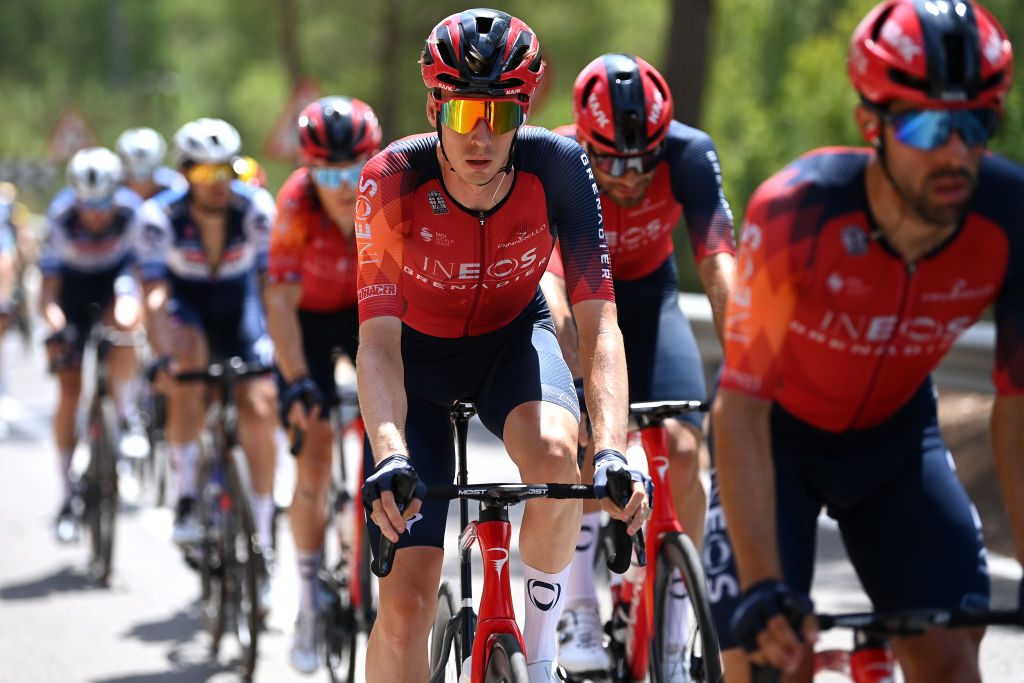Thymen Arensman forced out of Vuelta a España by late crash
Update: Ineos rule out major injuries, Thomas fights on after fall, Kuss survives late scare on stage 7

A seemingly straightforward transition stage for the Vuelta a España on Friday was marred by a series of crashes for several top contenders, with Thymen Arensman (Ineos Grenadiers) faring the worst and being taken to hospital in an ambulance after falling late on the stage.
The Dutchman, who was the lone abandon on the day, was caught up in a fall around 6km from the line when the peloton was building up speed for the bunch sprint, hitting the ground alongside Belgian racer Jimmy Janssens (Alpecin-Deceuninck).
After lying on the ground for a long time and being attended by team and race staff, Arensman was taken to hospital in a neck brace. The official race medical bulletin later reported that Arensman had suffered facial injuries and a broken collarbone.
Ineos later reported that Arensman underwent trauma protocol assessment with CT scans that ruled out cranial, spinal or further major injuries. After having stitches to close his facial injuries, he is "stable and remains under observation".
Earlier in the stage, Arensman’s Ineos teammate and GC contender Geraint Thomas fell heavily and hurt his right knee, the same one that he injured in a crash on stage 2, while Sepp Kuss (Jumbo-Visma) narrowly stayed out of trouble after all but hitting the ground.
Thomas’ crash came with around 130km to go when the Briton and another teammate, Kim Heiduk, were caught up in a fall. Thomas was able to regain contact with the peloton and was in the bunch for most of the day, although he finally crossed the line 24 seconds down on the main pack.
“G’s taking an ice bath, he hit his knee really hard, initially it looked really bad, but he was able to get going,” sports director Steve Cummings told reporters at the team bus after the finish.
Get The Leadout Newsletter
The latest race content, interviews, features, reviews and expert buying guides, direct to your inbox!
“At 50km to go, he was a bit nervous, but he’s come round. At the finish it looked like he was really moving much better.”
Asked how Thomas’ crash occurred, Cummings said: “It’s just slippery down here, it’s just the road, it was bad luck. You do 1,000 corners and one’s a bit slippier than all the others.”
While Cummings was still waiting for more information on Arensman when he talked to reporters, he said that the full evaluation of Thomas’ injuries would only come after a full examination: “Let’s see how he is later, it’s hard when he hit the floor. Although it was good that he was able to finish.”
The winner last year of Vuelta’s toughest mountain stage in Sierra Nevada last year, and fifth overall, Arensman was considered an outsider for the GC battle. Prior to stage 7, Thomas and Arensman were lying 23rd and 24th overall respectively, at 4:57 and 5:10 on race leader Lenny Martínez (Groupama-FDJ).
The first week of the 2023 Vuelta is proving to be a tough one for Ineos Grenadiers, who already lost one of their key support riders, Laurens De Plus, when he crashed and fractured his hip in the opening team time trial. Thomas has also fallen hard twice, and lost time on the other GC favourites at both summit finishes.
Ineos Grenadiers were not the only GC team facing crash trouble on Friday, as stage 6 winner Sepp Kuss came within a whisker of a bad fall at some 10 kilometres to go.
The Jumbo-Visma racer was back on his bike quickly, but he said it had been a near miss.
“I’m ok, there was a crash in front of me and I had nowhere to go but I didn’t really hit the ground and luckily I could get going fast enough,” he told reporters afterwards.
“It wasn’t dangerous in itself, but I think when it’s easy all day on these big roads, there’s too many nerves and not enough points to string out the bunch.”
Kuss was a little shaken but still upbeat enough to joke a little about his difficult day. “I think I used all my luck yesterday,” he told reporters.
Alasdair Fotheringham has been reporting on cycling since 1991. He has covered every Tour de France since 1992 bar one, as well as numerous other bike races of all shapes and sizes, ranging from the Olympic Games in 2008 to the now sadly defunct Subida a Urkiola hill climb in Spain. As well as working for Cyclingnews, he has also written for The Independent, The Guardian, ProCycling, The Express and Reuters.
